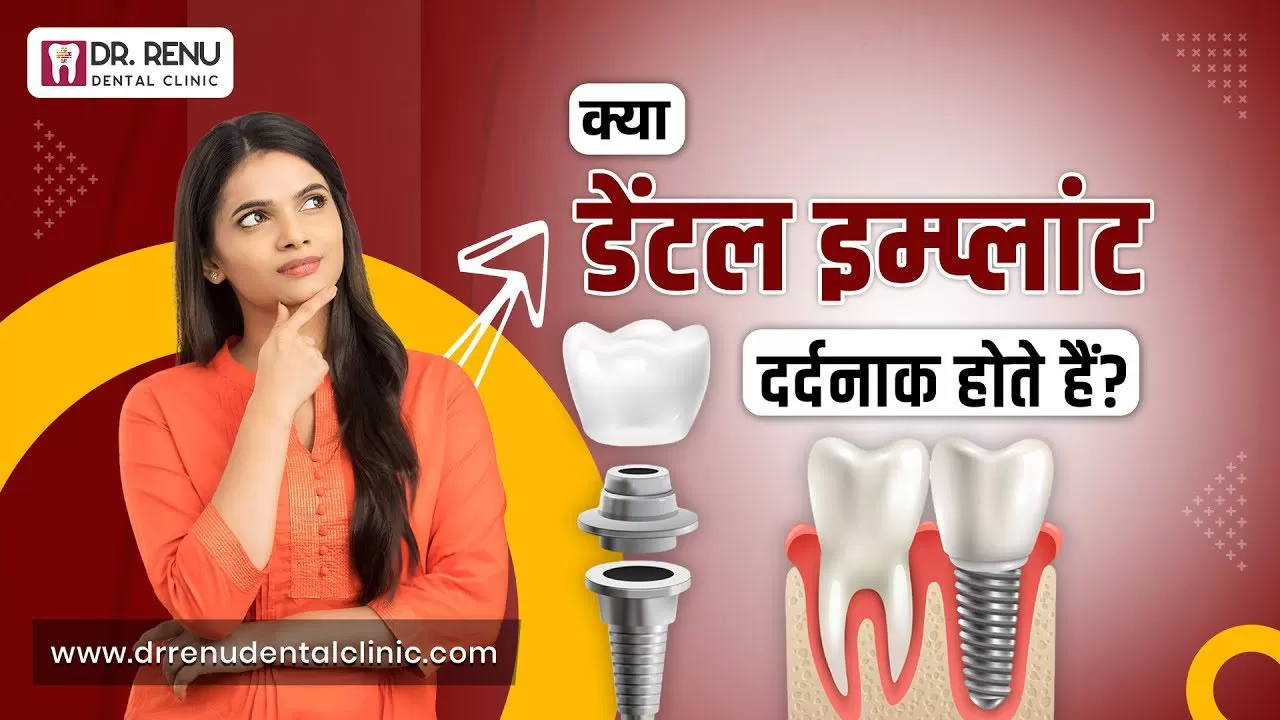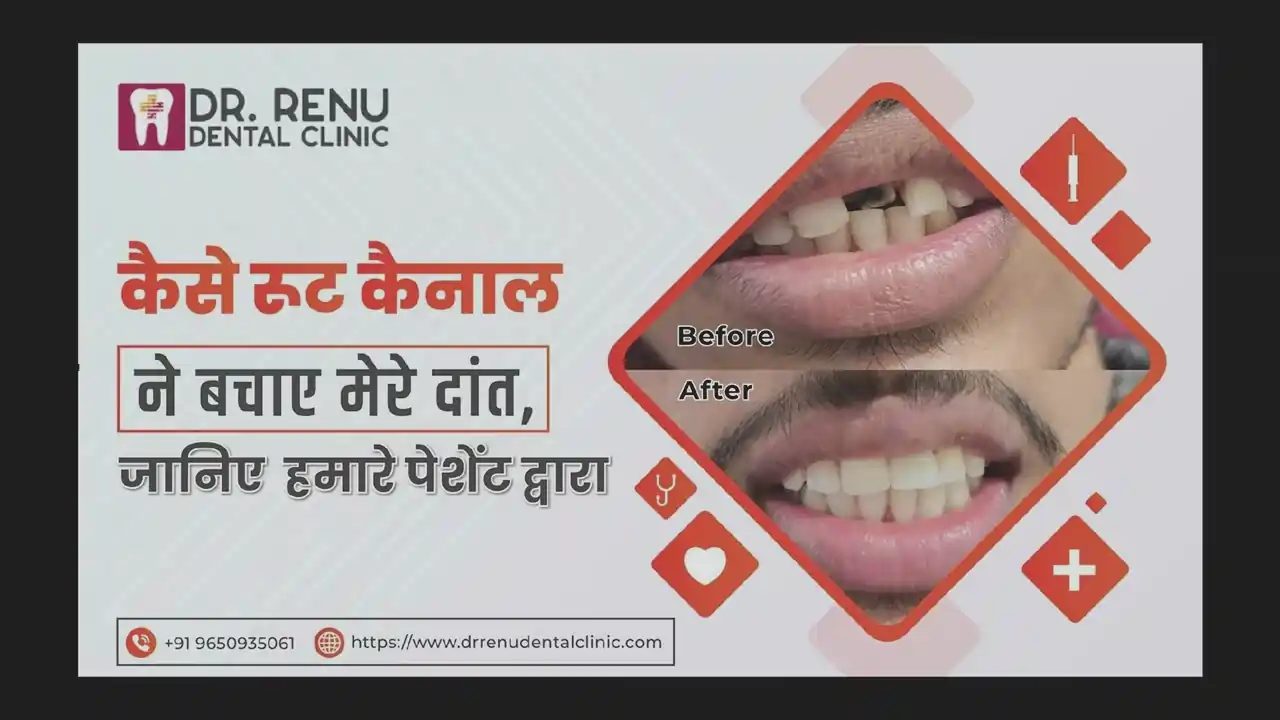Call us
+919650935061Address
Nirman Nagar, JaipurGoogle Rating
5.0( 607+ Reviews )

Overview
What are Dental Implants?

Overview
What are Dental Implants?
Dental implants are a common surgical treatment to replace missing teeth. The artificial teeth, denture, or crown is plugged right atop the stud, and the post itself makes your new teeth function like real teeth. They are done to treat complete and partial edentulism. Mostly, these dental implants are made of titanium, but some are made of ceramic. Both of these materials are safe and biocompatible. Dental implants have several advantages over conventional fixed partial dentures. The main aim of dental implants is to restore the patient to normal profile, function, speech, comfort, and health regardless of the dental issues. It may require a few procedures and several months of healing, but once they heal, you can use it much like a natural tooth. It is crucial to choose the best dental implant clinic in Jaipur for a seamless and best experience.
Signs That you Need
What are the Signs That you Need to get Dental Implants?
If you can't chew, feel pain in your mouth, and have bone loss, then you need dental implants. Below are some key signs that indicate you might need tooth implant in Jaipur:
Missing One or More Teeth
The loss of a single tooth may gradually cause the surrounding teeth to move into the gap, causing a misaligned smile. Implants are permanent fixes that restore function and prevent the adjacent teeth from shifting. They help you to gain confidence by creating a natural smile.
Difficulty Chewing or Eating
Missing or damaged teeth make it painful to chew food properly, hence affecting digestion. Dental implants restore full chewing ability and allow you to eat comfortably once again. This also prevents unnecessary strain on other teeth that would otherwise bear the extra pressure.
Loose or Uncomfortable Dentures
If your dentures slip while eating or talking, dental implants offer a more secure and stable alternative, eliminating the need for adhesives. Dental implants support fixed dentures, preventing movement and improving speech clarity.

Bone Loss in the Jaw
Bone loss in the jaw indicates the necessity for dental implants. Without teeth, the jawbone loses stimulation, resulting in degeneration, face drooping, and chewing difficulties. Dental implants work as natural tooth roots, promoting bone and avoiding future degeneration.
Severely Cracked or Broken Teeth
If you have broken teeth that are severely fractured and beyond repair, then you need dental implants. Fractured teeth, if left untreated, can lead to infections and oral cavities. Implants are a permanent and durable replacement that can be used for strength and stability.
Chronic Dental Infections or Severe Tooth Decay
Extraction becomes a viable option if your tooth is severely infected and cannot be saved with a root canal. Moreover, reinfections in the gums and jawbone can increase health risks. Implants prevent reinfection since they are clean and strong replacements.

Missing One or More Teeth
The loss of a single tooth may gradually cause the surrounding teeth to move into the gap, causing a misaligned smile. Implants are permanent fixes that restore function and prevent the adjacent teeth from shifting. They help you to gain confidence by creating a natural smile.
Difficulty Chewing or Eating
Missing or damaged teeth make it painful to chew food properly, hence affecting digestion. Dental implants restore full chewing ability and allow you to eat comfortably once again. This also prevents unnecessary strain on other teeth that would otherwise bear the extra pressure.
Loose or Uncomfortable Dentures
If your dentures slip while eating or talking, dental implants offer a more secure and stable alternative, eliminating the need for adhesives. Dental implants support fixed dentures, preventing movement and improving speech clarity.
Bone Loss in the Jaw
Bone loss in the jaw indicates the necessity for dental implants. Without teeth, the jawbone loses stimulation, resulting in degeneration, face drooping, and chewing difficulties. Dental implants work as natural tooth roots, promoting bone and avoiding future degeneration.
Severely Cracked or Broken Teeth
If you have broken teeth that are severely fractured and beyond repair, then you need dental implants. Fractured teeth, if left untreated, can lead to infections and oral cavities. Implants are a permanent and durable replacement that can be used for strength and stability.
Chronic Dental Infections or Severe Tooth Decay
Extraction becomes a viable option if your tooth is severely infected and cannot be saved with a root canal. Moreover, reinfections in the gums and jawbone can increase health risks. Implants prevent reinfection since they are clean and strong replacements.
Health Tips
Your Guide to a Healthier Smile
Our health tips video is given below which gives you a guide and practical advice to maintain a healthy smile. Learn expert tips from Dr. Renu on oral hygiene, preventive care, and nutrition to keep your teeth strong and bright every day.

15+ Years of Experience

Meet Our Doctor
Dr. Renu Chaudhary
BDS, MDS & PGCOI(PGI)
With over 15 years of experience, Dr. Renu Chaudhary is a trusted name in dental implantology. She is known for helping countless patients regain confidence through durable and natural-looking dental implants. Dr. Renu Chaudhary is an expert in using advanced techniques to ensure a seamless and comfortable experience. As one of the top dental implant specialists in Jaipur, she prioritises restoring smiles with precision and care by employing minimally invasive procedures that are both effective and affordable. Her commitment to quality healthcare makes her the preferred choice for those patients seeking a reliable and lasting dental restoration.
20K+
Dental Procedures
10K+
Smile Makeovers
20K+
Happy Patients
Why Choose
Why Choose Dr. Renu Dental Clinic for Dental Implants Treatment?
Dr. Renu Chaudhary is renowned for dental implants in Jaipur. Below are more reasons why you should choose Dr Renu Dental Clinic for dental implants:
Years of Experience
For over 15 years, Dr. Renu Chaudhary, a consultant prosthodontist and dental implantologist, has led the clinic. She has successfully done several dental implant treatments, demonstrating high proficiency and reliability, making her the best dentist for dental implants in Jaipur.
Advanced Clinic
Our clinic uses advanced equipment and the latest methods for dental implants in Jaipur to ensure exact fits and high-quality dental implants. This commitment to innovative technology increases the precision and success of implant treatments.
Transparent and Affordable Pricing
Our services, including oral surgeries, braces and cosmetic procedures, are quite economical. We are one of the best clinics for affordable dental implants in Jaipur and provide transparent pricing, so you are fully informed of the expenses before beginning with treatment.
Years of Experience
For over 15 years, Dr. Renu Chaudhary, a consultant prosthodontist and dental implantologist, has led the clinic. She has successfully done several dental implant treatments, demonstrating high proficiency and reliability, making her the best dentist for dental implants in Jaipur.
Advanced Clinic
Our clinic uses advanced equipment and the latest methods for dental implants in Jaipur to ensure exact fits and high-quality dental implants. This commitment to innovative technology increases the precision and success of implant treatments.
Transparent and Affordable Pricing
Our services, including oral surgeries, braces and cosmetic procedures, are quite economical. We are one of the best clinics for affordable dental implants in Jaipur and provide transparent pricing, so you are fully informed of the expenses before beginning with treatment.
What are the Types of Dental Implants?
There are different types of dental implants, each of which is designed to cater to specific dental needs and jaw conditions. The right choice of implant depends on the bone structure, oral health, and personal preference. Below are the common types of teeth implants in Jaipur, along with their advantages and disadvantages.
- 1. Endosteal Implants
The most common form is the endosteal implant. It is placed into the jawbone surgically. Endosteal implants are constructed from titanium and resemble tiny screws. They provide stability for artificial teeth.
Advantages
- Supports the artificial teeth strongly and durably.
- Bones naturally bond with the jaw for even greater support.
- Aesthetics is natural in appearance and function, just like natural teeth.
Disadvantages
- The bone needs to have a certain degree of density for placement to be successful.
- Placement healing may take several months.
- 2. Subperiosteal Implants
Subperiosteal implants are placed on top of the jawbone beneath the gum tissue. They are appropriate for individuals with low bone structure who need a bone graft.
Advantages
- They suit patients whose jaws have less density.
- The procedure is not as invasive as the endosteal implants.
- The healing process is shorter compared to any traditional implant.
Disadvantages
- They are relatively unstable because they are mounted on top of the jawbone.
- There is a higher likelihood of rejection or movement of implants with time.
- 3. Zygomatic Implants
Zygomatic implants are a more advanced option for patients with severe bone loss in the upper jaw. They are anchored into the cheekbone, or zygoma, instead of the jawbone.
Advantages
- Suitable for patients with extensive loss of the upper jawbone.
- Avoids the need for a bone grafting procedure.
- Strong support for full-arch restorations.
Disadvantages
- It is a complicated procedure that needs special expertise.
- Longer healing and recovery period than conventional implants.
- 4. All-on-4 Implants
This is a procedure that requires four implants that support full arches of teeth on the jawbone. It suits patients who have lost most or all their teeth.
Advantages
- It provides full-arch restoration in one procedure.
- It minimises the requirement for bone grafting.
- It has faster recovery than normal multiple implants
Disadvantages
- It is not applicable to individuals with extreme loss.
- It will require replacement or maintenance after some time.
- 5. Immediate Loading Dental Implants
Immediate-loading dental implants, or same-day implants, allow for the placement of a prosthetic tooth immediately following implant surgery. This eliminates the need for a healing period before attaching a crown.
Advantages
- It offers immediate beauty and function and avoids gaps in the smile.
- Reduces the overall treatment time compared to regular implants.
- Maintains bone structure by stimulating the jawbone from day one.
Disadvantages
- Initial implant support needs to have a strong bone density. Therefore, it is not advisable for patients with advanced
- gum disease or compromised bone structure.
- Too much pressure heightens the risk of failure of the implant.
- 6. Single-Visit Dental Implants
Single-visit dental implants only need one appointment to install the implant and attach a temporary crown. This procedure is designed for individuals who want an efficient and speedy solution for lost teeth.
Advantages
- Conserve time by conducting both the crown and implant installation in a single sitting.
- Reduces surgery, meaning less pain and quicker recuperation.
- Ensures an instantaneous boost in appearance and function.
Disadvantages
- It is not applicable to complicated cases that need bone grafting or extensive repair.
- To ensure long-term success, the implant must have excellent primary stability. More skill and technical requirements make it a costly treatment.
How do Dental Implants Work?
Dental implants are biocompatible titanium implants used as artificial teeth roots. They help with osseointegration, which is the integration of the implant with the jawbone. This helps stabilise the dental implant and prevents bone loss, a common complication following tooth extraction. The teeth implants in Jaipur work in the following ways:
- The process begins with a complete dental examination, which includes X-rays and 3D scans to assess bone density. If the patient does not have enough bone before the implant, a bone graft may be necessary.
- An incision is made in the gum to place the implant in the jawbone surgically. Healing takes three to six months, during which the implant fuses into the bone to form a firm foundation.
- After healing, an abutment (a small connector) is bonded to an implant. This serves as a base for the final restoration, which may be a crown, bridge, or denture. Artificial set within the natural tooth in the form of colour and shape is then placed over the abutment.
What is the Procedure for Getting Dental Implants?
The process of getting dental implants is multi-phased, providing a secure and long-lasting replacement for missing teeth. It involves careful planning, surgery, and healing before the final restoration is placed. The entire process can take several months, but dental implants offer a permanent and reliable solution for missing teeth, improving both function and aesthetics. Here’s a detailed breakdown of the procedure:
- 1. Initial Consultation and Evaluation
The process starts with a comprehensive dental check-up, including X-rays, 3D imaging, and scans to determine bone density and the general health of the mouth. The dentist checks if the patient has enough jawbone to support an implant. If there is significant bone loss, a bone graft may be necessary to strengthen the area before implantation.
- 2. Tooth Extraction (If Necessary)
If a decayed or damaged tooth remains, it needs to be extracted before the implant is placed. Sometimes, an implant can be placed directly after extraction, but more often, weeks must pass before surgery on the site.
- 3. Bone Grafting (If Required)
If the jawbone is too thin or weak, a bone graft is done. Bone material, either synthetic or from a donor, is added to build up the jaw. Healing after bone grafting takes a few months before implant placement.
- 4. Implant Placement Surgery
After preparing the bone, the dentist will make a small incision in the gum and then drill a hole into the jawbone. The titanium implant is carefully placed into the jawbone as an artificial tooth root. The gum is then stitched back, and the healing phase starts.
- 5. Osseointegration and Healing (3-6 Months)
The implant integrates itself into the jawbone through a process called osseointegration, which supports it and makes it impossible to lose bone tissue. This might take three to six months.
- 6. Attach Abutment
After a complete integration process, a short metal connector is attached to the implant. The connector is also known as the abutment. It supports the final prosthetic tooth that will be set. The gum needs a couple of weeks for healing around the abutment.
- 7. Crown or Prosthetic Attachment
Following the healing period, a prosthetic tooth called a crown is prepared in the exact shape, size, and colour of the patient’s other natural teeth. The crown is firmly attached to the abutment to complete the restoration.
- 8. Aftercare and Maintenance
The dentist provides aftercare instructions on how to brush and floss the implant properly and how to have regular checkups. Implants are quite strong, but proper oral hygiene will help the implant last long.
Transform Your Smile with Expert Dental Care!
Let’s Request a Schedule For Consultation
Book AppointmentWhat are the Things to Know Before You Get Dental Implants?
Before getting dental implants in Jaipur, you should be aware of procedures, recovery, and maintenance. Here are key factors to consider before you get dental implants:
- 1. You Need Good Jawbone Density
Dental implants require a strong jawbone for successful placement and stability. If your bone is too weak, a bone graft may be needed. This process involves adding bone material to strengthen the area before implantation. A thorough examination, including X-rays, helps determine if your jaw can support implants.
- 2. The Process Takes Several Months
Unlike traditional dentures or bridges, dental implants require multiple steps and months of healing. The implant must fuse with the jawbone through osseointegration, which can take 3 to 6 months. Rushing the process can lead to complications, so patience is key for long-term success.
- 3. Dental Implants Feel and Function Like Natural Teeth
Once fully healed, implants function like real teeth; you can eat, speak, and smile normally. They will not shift because they are fixed in place; hence, there is no discomfort, no special adhesives, and no dietary restrictions.
- 4. Oral Hygiene must be Proper
Although implants are resistant to cavities, the gums and tissues around them must remain healthy. The only way to prevent infections like peri-implantitis is through regular brushing, flossing, and professional cleanings. Poor oral hygiene can result in gum disease, which will compromise the stability of the implant.
- 5. Smoking can Impact Implant Success
Smoking slows down the blood circulation to the gums and thus reduces healing, with an increased risk for the implant to fail. Smokers are generally at a higher risk of complications during implant surgery compared to non-smokers. Smoking cessation before and after surgery increases the chance of long-term success of the implant.
- 6. Not Everyone is an Ideal Candidate
People with uncontrolled diabetes, autoimmune disorders, or severe gum disease may not be the best candidates for implants. These conditions can interfere with healing and increase the risk of complications. A thorough medical evaluation by your dentist will determine if implants are the right choice for you.
- 7. Implants Require an Investment
Dental implants are expensive compared to other tooth replacement alternatives, but they are a long-term solution. Unlike dentures and bridges, which may require replacement over time, implants can last a lifetime with proper care. Many clinics offer payment plans or financing options to make them more affordable.
- 8. There May Be Temporary Discomfort
Mild swelling, bruising, or discomfort is to be expected in the first few days after surgery but resolves within a short period. Most patients find the long-term benefits of implant placement far outweigh the short recovery period.
What are the Benefits of Dental Implants?
Dental implants in Jaipur are a long-lasting, natural-looking substitute for missing teeth. They improve oral function, prevent bone loss, and boost confidence. The benefits of dental implants are as follows:
- 1. Long-Term Solution
Unlike dentures or bridges that need to be replaced periodically, implants can be used for an entire lifetime when properly cared for. Their permanence makes them a cost-effective long-term investment in dental health and stability.
- 2. Healthy Jawbone
When teeth are missing, the jawbone deteriorates over time. Implants activate the jawbone, preventing further deterioration and ensuring that the facial structure remains intact. Thus, they eliminate the sunken look that so often occurs following tooth loss.
- 3. Prevents Teeth Shifting
After losing one of your teeth, the remaining surrounding teeth tend to shift in that empty area, causing misalignment and biting. Your teeth stay well-positioned through implants that cause a smile and a healthy, well-balanced face.
- 4. Prevents Adjacent Teeth From Damage
Traditional bridges require the destruction of healthy teeth for support. Implants work alone, preserving the adjacent teeth and minimising the possibility of decay or structural damage over time.
- 5. Enhances Self-Esteem
A complete, natural-looking smile enhances self-esteem and makes social events more fun. Implants can improve confidence in one’s appearance and oral health, whether in a personal or professional setting.
What are the Post-Operative Instructions for Dental Implants?
Proper post-surgical care is important to ensure an uneventful recovery and long-term success of your dental implants. These recommendations can help facilitate healing and prevent problems.
- 1. Manage Swelling and Pain
Mild swelling and discomfort are usual following surgery. For the first 24 hours, apply cold packs and take prescription pain medicines as directed. Avoid eating hot foods and chatting too much to reduce strain.
- 2. Follow a Soft Diet
For the first several days, eat soft foods like yoghurt, mashed potatoes, and smoothies. Avoid chewing on the implant site to prevent discomfort and promote recovery.
- 3. Maintain Oral Hygiene
Rinse your mouth gently with a saltwater solution or the recommended mouthwash to maintain the area clean. Use a soft-bristled toothbrush when brushing your teeth to avoid upsetting the implant site while still keeping your mouth clean.
- 4. Monitor Infection
Monitor any pain, swelling or bleeding that lasts longer than the expected time frame. If there is pus, increasing fever, or worsening symptoms, contact your dentist immediately for an evaluation.
- 5. Follow-up Appointments
Regular dental visits will encourage healthy healing and long-term success of the implant. Your dentist will look for problems and revise them to create further comfort and stability.
How Long Does Dental Implants Last?
Dental implants are a long-term replacement for lost teeth. If you take proper care of them, they can last forever. However, the duration can depend on many factors, including how well you take care of your teeth, your lifestyle, and how often you visit a dentist. Dental implants are attached at one end, using the patient’s jaw for its base, with the help of the titanium implant post.
Hence, it stays here for as long as human life lasts if one takes care of it accordingly. The top covering the white or visible portion called the crown would usually go off after serving between 10 and 15 years because it naturally wears down from use in time. Some of the factors that impact the duration are as follows:
- 1. Oral Hygiene
Regular brushing, flossing, and proper professional cleaning keep your mouth healthy and prevent these diseases from occurring, which helps in avoiding implant failure.
- 2. Lifestyle Choices and Diet
Bad habits like smoking, excessive drinking, and biting your teeth also weaken the implants over time. Healthy gums and strong jawbones tend to do much better in the long term.
- 3. Bone Density and Jaw Health
A robust, healthy jawbone serves as a secure basis for dental implants. Insufficient bone density can result in implant failure over time.
- 4. Implant Materials and Quality
The quality of the materials used determines the durability of dental implants. High-grade titanium and zirconia implants are resistant to corrosion and wear, assuring long-term stability.
Cost of Getting Dental Implants in Jaipur
The cost of the single implant can vary from ₹20,000 to ₹50,000. The dental implant cost in Jaipur depends on various factors. Some of them are as follows:
- 1. Number of Implants
The total cost of the treatment is determined by the number of implants required. A single tooth implant is less expensive than numerous implants or a full mouth restoration. Multiple implants necessitate additional surgical operations, raising total treatment costs.
- 2. Location
The cost of implants varies according to the clinic’s location, reputation, and infrastructure. A well-equipped facility with advanced technology, such as 3D imaging and guided implant surgery, can be more expensive, but it guarantees more precise and successful treatments.
- 3. Experience of the Dentist
The cost of dental implants in Jaipur depends on the doctor’s expertise and experience. Choosing a knowledgeable and skilled dentist assures accurate placement and lowers the chance of issues, making the expenditure worthwhile. If you are looking for a dental implant in Jaipur, Dr. Renu Chaudhary offers affordable treatment.
- 4. Material of the Implant
The material used to make dental implants has a considerable impact on their cost. High-quality titanium and zirconia implants are more durable but more expensive than lower-quality alternatives. Premium materials offer greater lifespan and biocompatibility, ensuring successful integration with the jawbone.
Myth & Fact
What are the Common Myths About Dental Implants?
Dental implants in Jaipur are very successful replacement options for missing teeth, but they are frequently overlooked because of common myths. Here are some predominant myths and facts surrounding them.
Myth : Dental Implants Hurt
Fact: Many people think that implant surgery is painful, but modern techniques and anaesthesia make it as painless as possible. Most patients experience only slight soreness, akin to a tooth extraction.
Myth : Implants are for old People
Fact: Age is immaterial; implants are suitable for anyone with missing teeth and healthy gums. Younger patients benefit from their long-term strength and function.
Myth : They Look Artificial.
Fact: Dental implants are intended to blend with other natural teeth. They create a very natural-appearing smile that cannot be differentiated from actual teeth through customised crowns that exactly replicate the colour and shape.
Myth : The Procedure is Risky
Fact: Dental implant surgery is very safe. Success is achieved in over 95% of surgeries. If a qualified dentist performs the surgery, complications rarely occur, and the benefits are many times higher than the risks.
Myth : Implants are too Costly
Fact: Implants can be costly upfront, but they're an investment for life. Implants are permanent. Dentures and bridges, for instance, are frequently replaced and, hence, are less viable long-term investments.
Myth : The Healing Process is Very Lengthy.
Fact: Most individuals take a few months to heal, although this may vary from person to person. The bone then fuses with the implant, giving lasting strength and support.
Testimonial (Google Reviews)
Patient Feedback on Google
Here is what our happy patients say on Google about Dr. Renu Dental & Multi Speciality services their visit experience and the results of offered treatments.
Vipin Khandelwal
I had an excellent experience at Dr. Renu Dental Clinic. The staff is incredibly friendly and professional, creating a welcoming and comfortable environment. Dr. Renu's expertise and gentle approach made the treatment smooth and pain-free. They take the time to explain procedures and answer questions, which is truly reassuring. Highly recommend this clinic for anyone seeking quality dental care!
Anshul Kayath
It was really a good experience at Dr. Renu's dental clinic. She treated our daughter's tooth cavity and pulpotomy done by her was painless. Best dental clinic in the area.
V.K h.k
I visited Dr. Renu Dental Clinic for a teeth whitening and smile makeover and couldn’t be happier with the results. Dr. Renu is the best cosmetic dentist in Jaipur, and her attention to detail is impeccable. My teeth are now brighter, and my smile looks better than ever. I highly recommend Dr. Renu for cosmetic dentistry services.
Jyoti
I recently had a root canal procedure and capping of the tooth done at Dr Renu's dental clinic, and I couldn’t be more pleased with the experience. Dr. Renu and her entire staff were exceptional. From the moment I walked in, I was greeted with warmth and professionalism. The procedure was explained thoroughly, and Dr. Renu ensured I was comfortable throughout. The entire team demonstrated great expertise and care, making a potentially stressful experience quite pleasant. The follow-up care has been impeccable, and I’m delighted with the results. I highly recommend Dr.Renu and her team for anyone seeking top-notch dental care."
FAQs
Everything You Need to Know
At our clinic, patient satisfaction and trust are our top priorities. Dr. Renu Chaudhary.
A tooth implant in Jaipur is a long-term solution for missing teeth, involving a titanium post surgically placed into the jawbone to act as a tooth root. This provides a strong foundation for a replacement tooth, ensuring durability and a natural appearance. At Dr. Renu Dental Clinic, the best dental implant clinic in Jaipur, we use advanced techniques for seamless implant procedures.
People who lose one or several teeth and possess sufficient bone density and oral health are the best candidates for dental implants. A complete assessment by a dental technician is required to know if something is good.
Jaipur full-mouth dental implants are a lifetime if properly taken care of and maintained in very good condition. The crowns or prosthetics that are on them, though, would have to be renewed from time to time since they tend to break down naturally after 10 to 15 years.
Dental implants have proven to be a safe and effective method of replacing missing teeth. They function extremely well, particularly when performed by trained professionals and accompanied by good mouth hygiene.
The procedure is performed under local anesthesia, ensuring a painless tooth replacement with dental implants in Jaipur. Patients may experience mild discomfort post-surgery, which subsides within a few days. Our expert dental implant specialist in Jaipur ensures a smooth and comfortable experience.
The cost varies based on factors such as the number of implants, whether additional procedures (such as bone grafting) are necessary, and geographically where one is located. To get a better estimate, it is always better to consult your dentist.
The oral implants are as well maintained as normal teeth, so they should be brushed, flossed, and checked in with the dentist. Keeping the teeth and gums in good health will avoid future complications and extend the lifespan of the implants for as long as possible.
Every insurance plan is unique. Some insurance plans do not pay for all the expenses, whereas others do. To find out what your insurance pays for, you need to read your contract or speak to your provider.
The dental implant cost in Jaipur varies based on factors such as implant type, procedure complexity, and materials used. At our dental implants hospital in Jaipur, we offer affordable dental implants in Jaipur without compromising on quality. Contact us for a personalized consultation and cost estimate.
A painless tooth replacement with dental implants in Jaipur can last a lifetime with proper care. Most dental implant specialists in Jaipur recommend regular oral hygiene and routine dental checkups to ensure longevity.
If you're searching for the best clinic for dental implants in Jaipur with affordable prices, Dr. Renu Dental Clinic is the ideal choice. We specialize in dental implant treatment near me in Jaipur, offering high-quality and cost-effective solutions.
Most people with healthy gums and sufficient jawbone are good candidates for dental implants hospital in Jaipur. A thorough consultation with our best dentist for dental implants in Jaipur will help determine your suitability.














 Facebook
Facebook
 Instagram
Instagram